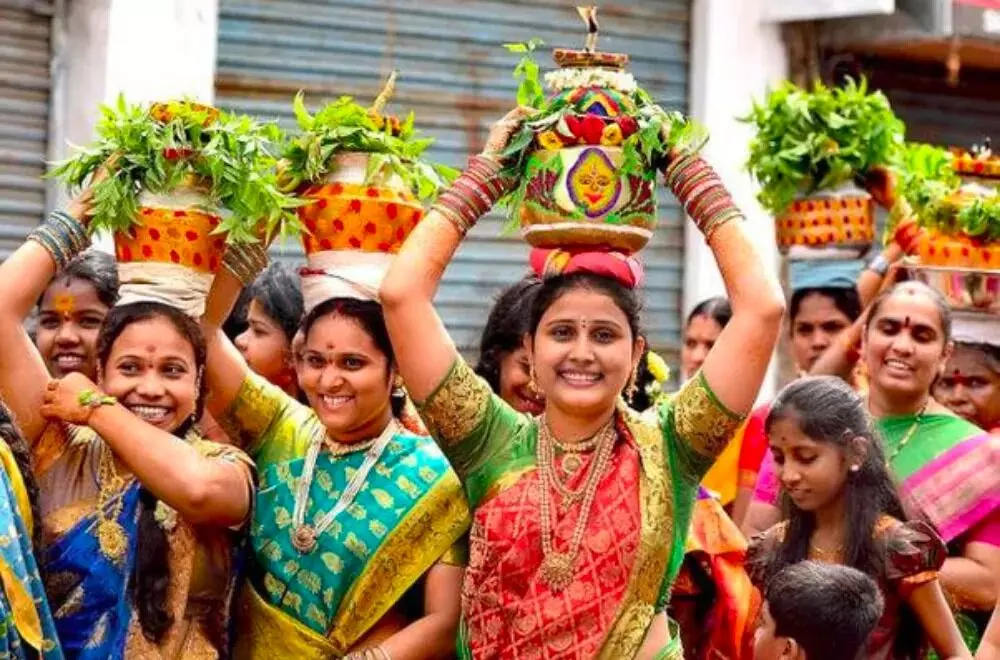With prayers and colourful pageantry, Telangana kickstarts Bonalu from June 25
While Bonalu is deeply rooted in tradition and faith, the festival also holds scientific importance.
By Nikisha Uddagiri
Hyderabad: Bonalu has a special place among Telangana’s many festivals. This traditional Hindu festival is celebrated with great fervour by the people of Telangana, particularly in Hyderabad and the surrounding regions.
During the formation of Telangana, the festival helped women unite and be a part of the Telangana moment. Later, after the formation, Bonalu emerged as Telangana State Festival celebrated in over 225 temples across Hyderabad and Secunderabad.
The rituals performed during Bonalu are believed to ward off evil spirits and bring prosperity to the community. It is a time when people come together, transcending barriers of caste, creed, and socioeconomic status, to celebrate their shared cultural roots and express their deep devotion to the goddess.
Hyderabad’s Bonalu is a vibrant celebration on Sundays of Aashadham, the fourth month of the Telugu calendar which usually falls in July and August.
Devotees flock to various temples across the city, including the Jagadamba temple at Golconda Fort and other prominent temples such as Ujjaini Mahakali Temple and Gandimaisamma Temple.
T Malathi, a resident of Bowenpally, describes Bonalu as an early morning festivity filled with lively traditions. “We wake up early, prepare Bonam, decorate pots, and wear traditional attire. With Bonam carefully balanced on our heads, we make our way to the temple, dancing joyfully to the rhythmic beats.”
The festival involves rituals like pouring water on the feet of women carrying Bonalu to calm the aggressive spirit of the Mother Goddess. In Secunderabad’s Lashkar area, the Bonalu celebrations start with Edurukolu, symbolising the homecoming of the Goddess, followed by Bonalu jatara and other rituals.
At Gunfoundry Muthyalamma Temple, with its two-century-old tradition, celebrations continue for over two days with processions and various events, culminating in the Ghatam procession.
Bonalu involves the worship of the Mother Goddess in regional forms like Maisamma, Pochamma, Yellamma, Peddhamma, Dokkalamma, Ankalamma, Poleramma, Maremma, and Nookalamma.
History
Bonalu is dedicated to the worship of the Hindu Goddess Mahakali, a fierce embodiment of feminine power. The festival typically falls during the months of July and August and spans across four consecutive Sundays.
It is believed to have originated in the 19th century, during the reign of the Kakatiya dynasty. The festival’s roots can be traced back to a plague outbreak that devastated the region. People sought the blessings of Mahakali, imploring her to rid the land of the disease. Miraculously, the epidemic eventually subsided, leading to the establishment of Bonalu as an annual festival. However, according to Mamidi Harikrishna, director of the State Department of Language and Culture, said in his research the celebration of the festival dates back to the Indus Valley civilisation.
Ancient wisdom, modern understanding
While Bonalu is deeply rooted in tradition and faith, the festival also holds scientific importance. The timing of Bonalu, during the monsoon season, coincides with the increased prevalence of waterborne diseases. Bonalu, which derives its name from the Telugu word "bhojanam" (meal), signifies the act of offering a meal to the goddess. The offering of Bonam, a mixture of cooked rice, jaggery, curd, and turmeric, holds great cultural significance and is believed to have antimicrobial properties. Turmeric, a vital ingredient in the Bonam, possesses natural medicinal properties known for its antibacterial and anti-inflammatory effects.
“This is similar to how GHMC does chlorination in the city to ensure hygiene. Pothuraju’s whip during Bonalu, filled with turmeric, acts as a powerful antibiotic, symbolically spreading its healing properties and warding off negativity while dancing to the rhythmic beats of the festivities,” said Harikrishna.
The Mighty Pothuraju
One of the most captivating aspects of Bonalu is the presence of Pothuraju. Describing Pothuraju Harikrishna said, “Pothuraju is said to be the only brother of the seven sisters (seven Goddesses), and their trusted aide and protector. He is portrayed as a fierce warrior, adorned with traditional attire, elaborate jewellery, and a towering headdress. Pothuraju’s role is to dance in a trance-like state, embodying the spirit of Mahakali. It is believed that he possesses divine power and safeguards the devotees during the festival.”
The Enigmatic Dance of Pothuraju
Pothuraju’s dance is an enchanting spectacle that captivates the onlookers. With his powerful movements, dynamic leaps, and synchronised footwork, he creates an electrifying atmosphere. The beats of traditional drums reverberate through the air, intensifying the energy of the performance. Pothuraju’s dance not only entertains but also invokes a sense of spiritual connection and awe among the spectators.
Cultural Exchange
Bonalu, once a local festival, has gained recognition and popularity beyond the borders of Telangana. In recent years, the festival has garnered attention from domestic and international tourists. The festivities have expanded to other parts of India, including cities like Bengaluru, Mumbai, and Chennai, where Telugu-speaking communities celebrate Bonalu with equal enthusiasm. This fosters cultural exchange and reinforces the unity and diversity of India’s cultural tapestry.